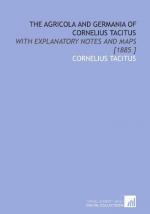
|
| Name: _________________________ | Period: ___________________ |
This test consists of 15 multiple choice questions and 5 short answer questions.
Multiple Choice Questions
1. What did Tacitus claim was the purpose of "baritus"?
(a) To challenge the enemy to a battle from afar.
(b) To show appreciation for a well-done victory.
(c) To impress a female with a handsome song.
(d) To unite valour before battle.
2. Of the following, which was one way a German became a slave among his own men?
(a) Lacked a kill by the age of fifteen.
(b) Commited adultery.
(c) Surrendered his shield.
(d) Gambled his freedom away.
3. What historic figure was known to visit Germany and found the city Asciburgium?
(a) Aulus.
(b) Virgil.
(c) Homer.
(d) Ulysses.
4. Why did Agricola's mother discourage him from studying philosophy?
(a) It was too inactive.
(b) It was too pretentious.
(c) It was a poor man's study.
(d) It "ate the mind."
5. How were the Germans' squadrons grouped?
(a) By general's choice.
(b) Randomly.
(c) By family or clan.
(d) By number of previous kills.
6. How did Tacitus distinguish some tribes as German and not Sarmations?
(a) Sarmations were blonde and lighter-skinned.
(b) By their primary weapons.
(c) Sarmations were nomadic while Germans lived in homes.
(d) By their clothing style.
7. The Chatti showed steady courage in warfare through what?
(a) Their steady chants.
(b) They kept an unwavering flag throughout battle.
(c) Deliberate movements rather than quick rushes.
(d) Their impressive unified steps into the beginning of a battle.
8. Why would the Cotini be more ashamed than other tribes because they worked in the iron mines of Germany?
(a) They could have used the iron to make weapons instead of tribute to the Romans.
(b) It was disgraceful against the German kings to mine the iron for anyone else.
(c) Iron mines were considered base because of its disturbance to the outdoor altars.
(d) The iron mines were considered as low of a job as a slave.
9. Who were the only ones allowed to decide on capital punishment, imprisonment, and flogging?
(a) Priests.
(b) Chiefs.
(c) Kings.
(d) Generals.
10. What event caused such a great financial loss to the state that Agricola had to rectify it?
(a) Inflation.
(b) Drought.
(c) Infestation of a corn beetle.
(d) The people looted after a great fire.
11. What was one of the most shameful acts a German soldier could do?
(a) Cut his hair.
(b) Die before his first kill.
(c) Throw away his shield.
(d) Kill a woman or child.
12. Although feuds between families passed on to heirs, what reconciled them?
(a) Enough gold and silver.
(b) An arranged marriage to unite the two families.
(c) Enough cattle and sheep.
(d) A fair duel.
13. Tacitus felt the only form of wealth Germans had was __________.
(a) Livestock.
(b) Gold.
(c) Their population number.
(d) Cereal crops.
14. What was unique about a betrothed German couple?
(a) They were encouraged to marry outside the clan.
(b) The woman offered the dowry, not the man.
(c) Mothers chose the bride and groom.
(d) The man offered the dowry, not the woman.
15. "The Germania" is believed to come from a single manuscript written in what century?
(a) 9th century.
(b) 100 A.D.
(c) Early 6th century.
(d) Early 16th century.
Short Answer Questions
1. What was an obligation of a follower to a German chief in addition to protecting him?
2. In addition to arms as gifts, what had the Romans influenced the Germans to accept as gifts?
3. What were the Germans' choice of arms?
4. In addition to omens in a bird's flight, what other ways did Germans read omens and warnings?
5. How did having children help Agricola's career?
|
This section contains 607 words (approx. 3 pages at 300 words per page) |

|




